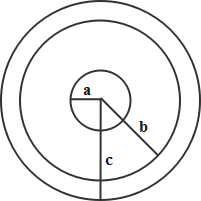Question
Question: A solid conducting sphere of radius a has a net positive charge 2Q. A conducting spherical shell of ...
A solid conducting sphere of radius a has a net positive charge 2Q. A conducting spherical shell of inner b radius and outer radius c is concentric with the solid sphere has a net charge –Q. The surface charge density of the inner and the outer shell will be

a)−4πb22Q,4πc2Q
b)−4πb2Q,4πc2Q
c)0,4πc2Q
d)None of the above
Solution
In the above question it is given that the solid sphere as well as the shell are conducting. Hence the charge on either one will induce charge on other. Therefore obtaining the net charge on the inner surface and the outer surface will enable us to determine the surface charge density.
Formula used:
σ=4πr2q
Complete step-by-step solution:
Let us say there is a spherical surface of radius ‘r’. If charge ‘q’ is distributed along the surface of the sphere, then the surface charge density σ is given by,
σ=4πr2q
The solid sphere as well as the shell are conducting. The charge on the solid sphere is +2Q. Therefore by induction, the solid sphere will induce a negative charge on the inner surface of the shell of magnitude 2Q. Hence an equal amount of charge will move on to the outer surface of the shell but of different nature. Therefore a charge of +2Q will get developed on the outer side. Since the net charge on the shell is negative Q, the charge on the outer surface has to be +Q.
Hence the surface charge density σ1 of the inner shell is,
σ1=4πb2−2Q
Similarly the surface charge densityσ2 of the outer shell is,
σ2=4πc2Q
Therefore the correct answer of the above question is option a.
Note: It is to be noted that the sphere as well as the shell are conducting in nature. Hence the induction of charges is possible. It is also to be noted that the external charge given to the shell is not required by us to determine the surface charge density if the net charge is known.
